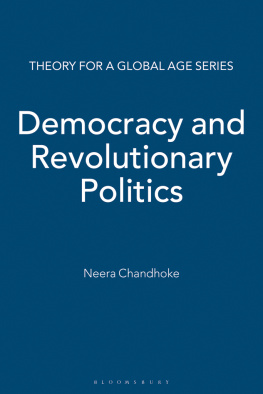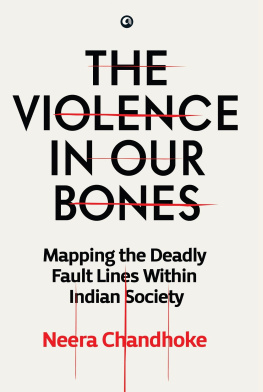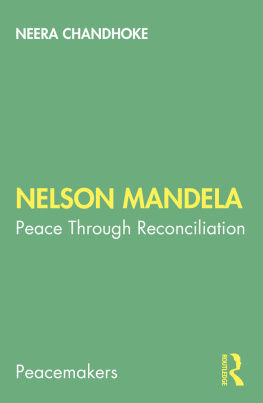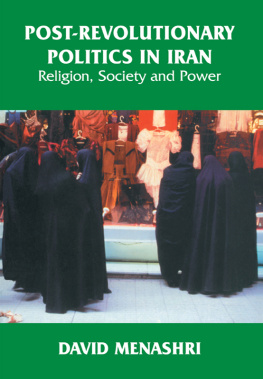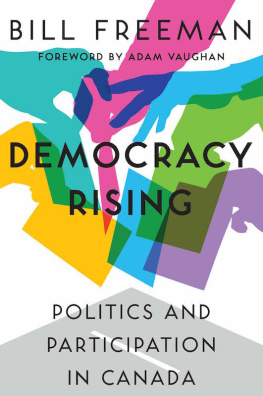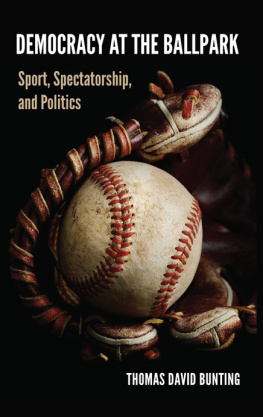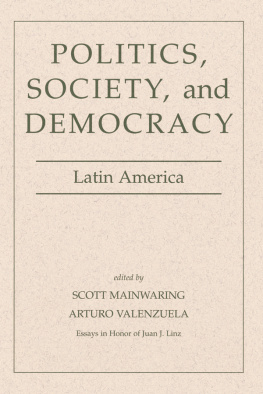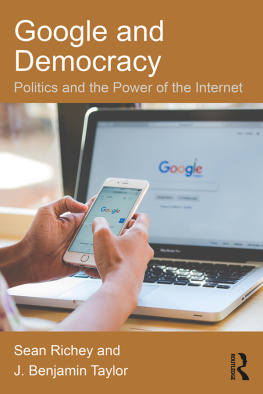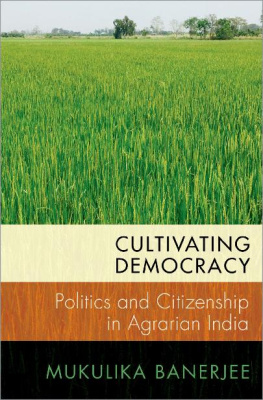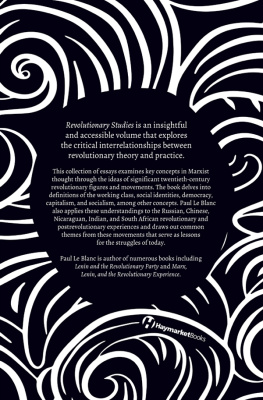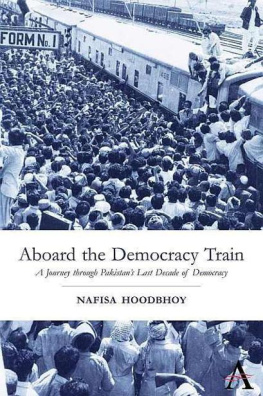Neera Chandhoke - Democracy and Revolutionary Politics
Here you can read online Neera Chandhoke - Democracy and Revolutionary Politics full text of the book (entire story) in english for free. Download pdf and epub, get meaning, cover and reviews about this ebook. year: 2015, publisher: Bloomsbury UK, genre: Politics. Description of the work, (preface) as well as reviews are available. Best literature library LitArk.com created for fans of good reading and offers a wide selection of genres:
Romance novel
Science fiction
Adventure
Detective
Science
History
Home and family
Prose
Art
Politics
Computer
Non-fiction
Religion
Business
Children
Humor
Choose a favorite category and find really read worthwhile books. Enjoy immersion in the world of imagination, feel the emotions of the characters or learn something new for yourself, make an fascinating discovery.
- Book:Democracy and Revolutionary Politics
- Author:
- Publisher:Bloomsbury UK
- Genre:
- Year:2015
- Rating:4 / 5
- Favourites:Add to favourites
- Your mark:
- 80
- 1
- 2
- 3
- 4
- 5
Democracy and Revolutionary Politics: summary, description and annotation
We offer to read an annotation, description, summary or preface (depends on what the author of the book "Democracy and Revolutionary Politics" wrote himself). If you haven't found the necessary information about the book — write in the comments, we will try to find it.
Democracy and Revolutionary Politics — read online for free the complete book (whole text) full work
Below is the text of the book, divided by pages. System saving the place of the last page read, allows you to conveniently read the book "Democracy and Revolutionary Politics" online for free, without having to search again every time where you left off. Put a bookmark, and you can go to the page where you finished reading at any time.
Font size:
Interval:
Bookmark:
Democracy and
Revolutionary Politics
THEORY FOR GLOBAL AGE
Series Editors: Gurminder K. Bhambra and Robin Cohen
Editorial Board: Michael Burawoy (University of California Berkeley, USA), Neera Chandoke (University of Delhi, India), Robin Cohen (University of Oxford, UK), Peo Hansen (Linkping University, Sweden), John Holmwood (University of Nottingham, UK), Walter Mignolo (Duke University, USA), Emma Porio (Ateneo de Manila University, Philippines), Boaventura de Sousa Santos (University of Coimbra, Portugal).
Globalization is widely viewed as a current condition of the world, but there is little engagement with how this changes the way we understand it. The Theory for a Global Age series addresses the impact of globalization on the social sciences and humanities. Each title will focus on a particular theoretical issue or topic of empirical controversy and debate, addressing theory in a more global and interconnected manner. With contributions from scholars across the globe, the series will explore different perspectives to examine globalization from a global viewpoint. True to its global character, the Theory for a Global Age Series will be available for online access worldwide via Creative Commons licensing, aiming to stimulate wide debate within academia and beyond.
Each book in the series focuses on a particular theoretical issue or topic of empirical controversy and debate, addressing theory in a more comprehensive and interconnected manner in the process. With books commissioned from scholars from across the globe, the series explores understandings of the global and global understandings from diverse viewpoints. The series will be available in print, in eBook format and free online, through a Creative Commons licence, aiming to encourage academic engagement on a broad geographical scale and to further the reach of the debates and dialogues that the series develops.
Also in the series
Connected Sociologies
Gurminder K. Bhambra
Eurafrica: The Untold History of European Integration and Colonialism
Peo Hansen and Stefan Jonsson
On Sovereignty and Other Political Delusions
Joan Cocks
Postcolonial Piracy: Media Distribution and Cultural Production in the Global South
Edited by Lars Eckstein and Anja Schwarz
The Black Pacific: Anticolonial Struggles and Oceanic Connections
Robbie Shilliam
Forthcoming titles
Cosmopolitanism and Antisemitism
Robert Fine and Philip Spencer
Debating Civilizations: Interrogating Civilizational Analysis in a Global Age
Jeremy Smith
John Dewey: The Global Public and Its Problems
John Narayan
Stark Utopia: Debt as a Technology of Power
Richard Robbins and Tim Di Muzio
Democracy and
Revolutionary Politics
Neera Chandhoke
Bloomsbury Academic
An imprint of Bloomsbury Publishing Plc

Civil society was a key political concept at the close of the twentieth century associated, as it was, with social movements in Eastern Europe that heralded the end of the Soviet Union and the bipolar world that the cold war had sustained. The twenty-first century, in turn, began with similar social movements, in other parts of the world, against monarchical regimes and authoritarian polities. From Nepal to Tunisia to Libya, people organized collectively and consistently for civil and political liberties and for democracy in various forms. While the relationship between civil society and democracy has long been charted, that between violent protest or political violence and democracy, less so. And yet, many of these collective mobilizations were also violent and not just contingently so.
In her important book Democracy and Revolutionary Politics, Neera Chandhoke argues for the necessity of examining the idea of violence, and the specificities of political or revolutionary violence, in the context of classical concerns with the main subjects of political theory justice and the state. Since Weber, the latter has been directly associated with a claim to legitimacy for a monopoly over violence within a given territory, with democratic sovereignty the currently accepted basis of that claim to legitimacy. Given the impact of violence and, in particular, revolutionary violence, upon the shaping of democratic states, Chandhoke argues, it is not possible simply to dismiss non-state violence, or to look for single-issue explanations justifications or condemnations that either place it outside the dynamics of democratic politics or as hostile to it. Instead, the book is a meticulous working through of the complexities and ambiguities of political violence and an intimate examination of its relation to theoretical and actual contradictions of democratic politics.
This work of theory is undertaken through an examination of the armed struggle waged by Maoists in democratic India and asks two interrelated questions: can revolutionary violence be justified in democratic contexts and in what circumstances can it be justified? Even if it can be justified, Chandhoke continues, is it a prudent way of doing politics in democracies? This ambiguity forms the central point of the argument. As Chandhoke perceptively notes, what is at issue here is the necessity, always, of being able to claim justice from the state, even if and perhaps especially if that state understands itself as democratic. While much of the book addresses violence through an empirical lens focused on the politics of the Maoists, the conclusion addresses the political thought of one of the most renowned proponents of non-violence, Mohandas Karamchand Gandhi.
The book is a superb illustration of one of the key aims of the Theory for a Global Age series, namely, of seeking to understand what theory might look like if we started from places other than Europe and from persons other than European thinkers. The focus on an episode from the history of the global South is illuminating about that episode, but actually does much more as well. It provides an excellent exposition of the possibilities of how the conceptual and political debates on violence, especially political violence, can be broadened and enriched by taking a global perspective.
Gurminder K. Bhambra
I began work on this project when I joined Rainer Forsts research programme Justitia Amplificata, Goethe University, Frankfurt, as senior fellow (20122013). I wish to express my profound gratitude to Rainer for his support and friendship. During the period of the fellowship, I stayed at Forschungskolleg Humanwissenschaften at Bad Homburg. The institute provided ideal surroundings for sustained work, as well as relaxation amidst the company of other scholars. Thanks to Ingrid, Beate and Andreas for making my stay such a pleasant one. I recollect our treks in more than ankle-deep snow in the middle of the German winter, to visit a restaurant or a micro-brewery, with great nostalgia.
Back in Delhi, I began to write up the work as National Fellow, Indian Council of Social Science Research, New Delhi (20132015). Thanks to Professor Sukhdeo Thorat, the chairman of the ICSSR, Professor Ramesh Dadich, member-secretary, and Dr Sanchita Dutta, for their co-operation and help. I was affiliated to the Centre for Contemporary Studies, Nehru Memorial Museum and Library, Teen Murti House, New Delhi, during the period of the fellowship. As always, it is a pleasure to work in the magnificent library of the NMML, stroll through sylvan surroundings and participate in seminar programmes. My gratitude to Professor Mahesh Rangarajan and Dr Balakrishnan. May NMML flourish even more under the able guidance of Mahesh.
Next pageFont size:
Interval:
Bookmark:
Similar books «Democracy and Revolutionary Politics»
Look at similar books to Democracy and Revolutionary Politics. We have selected literature similar in name and meaning in the hope of providing readers with more options to find new, interesting, not yet read works.
Discussion, reviews of the book Democracy and Revolutionary Politics and just readers' own opinions. Leave your comments, write what you think about the work, its meaning or the main characters. Specify what exactly you liked and what you didn't like, and why you think so.

